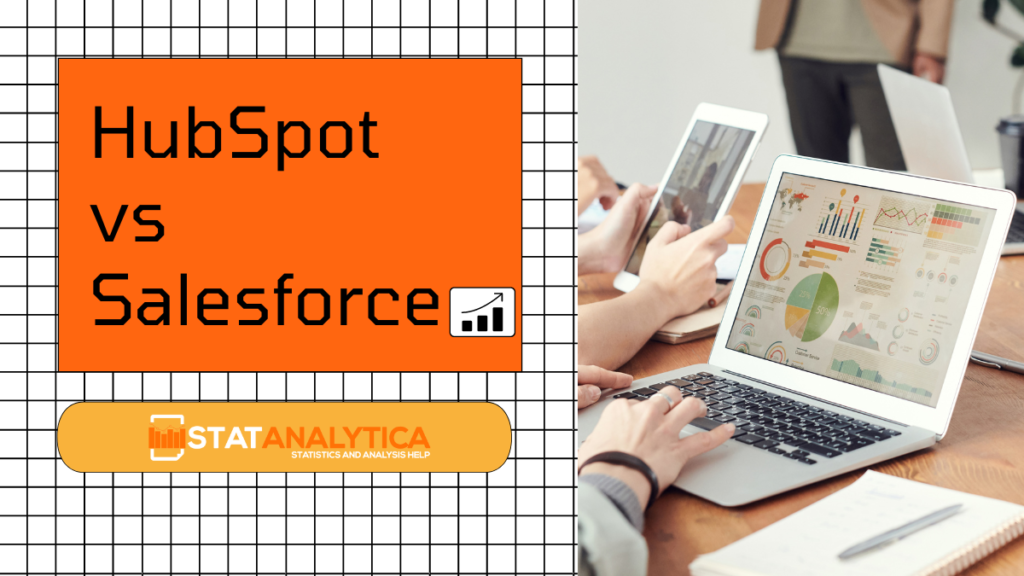Choosing the right Customer Relationship Management (CRM) tool can significantly impact your business’s efficiency and profitability. Two of the leading CRMs in the market are HubSpot and Salesforce. Both offer powerful features to help manage customer relationships, streamline processes, and boost sales. In this guide, we’ll compare HubSpot vs Salesforce across eight criteria to help you determine which is best for your business.
Overview: HubSpot and Salesforce
Table of Contents
What is HubSpot?
HubSpot is a CRM designed to unify marketing, sales, content management, and customer service. It comprises several ‘hubs’ or tools that can be purchased separately or together based on your business needs.
HubSpot is known for its user-friendly interface and is especially popular among small to medium-sized businesses focusing on inbound marketing strategies.
What is Salesforce?
Salesforce is a cloud-based CRM primarily aimed at helping businesses manage customer relationships. It offers tools for tracking sales, managing customer information, providing customer service, and marketing products or services.
Salesforce is recognized for its extensive customization options, making it a preferred choice for large or growing businesses.
Quick Comparison: HubSpot vs Salesforce
| Criteria | HubSpot | Salesforce |
| Features | Marketing-focused, user-friendly | Sales-focused, highly customizable |
| Ease of Use | Intuitive, easy for beginners | Complex, better for large teams |
| Security | High compliance | High compliance |
| Customization | Custom objects, workflows | Extensive customization |
| Integrations | 1,000+ integrations | 2,500+ integrations |
| Accessibility | Highly accessible, intuitive | Complex but powerful |
| Pricing | Affordable for small businesses | Expensive, per user pricing |
| Customer Support | Highly rated, accessible | Mixed reviews, additional costs |
Detailed Comparison: HubSpot vs Salesforce
Let’s dive into a detailed comparison of HubSpot and Salesforce across eight key criteria: Features, Ease of Use, Security, Customization, Integrations, Accessibility, Pricing, and Customer Support.
1. Features
Both HubSpot and Salesforce aim to create an all-in-one digital workspace for organizations, but they have different strengths.
HubSpot Features
- Marketing Focus: HubSpot excels in marketing tools like email marketing, ads software, and marketing analytics.
- User-Friendly Interface: Known for its simplicity, HubSpot is easier to navigate, making it ideal for small to medium-sized businesses.
- AI Capabilities: Offers AI-enabled features such as AI Email Writer and Social Caption Generator.
User Feedback
- “Very easy to navigate and useful for daily work routines.”
Salesforce Features
- Sales Focus: Salesforce offers advanced sales tools, including custom databases and workflow automation.
- Customization: Highly customizable with an extensive app store and robust API functions.
- AI Integration: Native AI solution called Einstein to enhance CRM functionalities.
User Feedback
- “Powerful tool once set up but can be overwhelming initially.”
2. Ease of Use
HubSpot
- Intuitive Interface: HubSpot is known for its user-friendly interface, making it easy for new users to adopt.
- Learning Curve: While easy to use, it can be overwhelming initially due to its range of features.
User Feedback
- “Lead management is very easy and simplifies my job.”
Salesforce
- Complex Interface: Salesforce offers a more complex interface with extensive customization options, which can be challenging for new users.
- Scalability: Ideal for larger teams due to its flexibility and scalability.
User Feedback
- “Flexible and scalable solution but not very intuitive.”
3. Security
Both HubSpot and Salesforce comply with strict security standards and data regulations, ensuring a secure experience for users.
Common Certifications
- CCPA
- GDPR
- SOC 2
- SOC 3
- TRUSTe
Additional Certifications (Salesforce)
- ASP SaaS (Japan)
- CCCS (Canada)
Both platforms offer robust security, making them suitable for businesses of all sizes.
4. Customization
Customization is a strong point for both HubSpot and Salesforce.
HubSpot
- Custom Objects and Properties: Allows users to create custom objects and properties to organize specific data models.
- Workflows and Webhooks: Expands functionality through customizable workflows.
User Feedback
- “Can be customized and functionality greatly expanded through workflows.”
Salesforce
- Extensive Customization: Allows customization around any data solutions needed by the company.
- App Store and API: Supports extensive third-party integrations and custom app development.
User Feedback
- “Ability to customize around any data solutions is a huge benefit.”
5. Integrations
Integrations are crucial for connecting different business tools and improving efficiency.
HubSpot
- Number of Integrations: Over 1,000 integrations available.
- Key Integrations: Microsoft applications, Google applications
, Slack, Zoom, LinkedIn.
User Feedback
- “Integration possibilities are admirable but limited for some specialized tools.”
Salesforce
- Number of Integrations: Over 2,500 integrations available.
- Integration Ecosystem: Known for its extensive integration capabilities.
User Feedback
- “The most powerful thing is the integration with other systems and apps.”
6. Accessibility
Accessibility covers both the ease of use and the ability to access data within the platform.
HubSpot
- User Interface: Highly rated for its intuitive and accessible design.
- Data Accessibility: Easy to organize and access information across the organization.
User Feedback
- “Took less than 30 minutes to understand and learn the basics.”
Salesforce
- Complex but Functional: While the interface is complex, it offers powerful functionality.
- Commitment to Accessibility: Salesforce is working on improving user experience, but it still lags behind HubSpot in this regard.
User Feedback
- “User experience is not good, but offers excellent UI and accessibility for sales data.”
7. Pricing
Pricing is a significant factor for businesses when choosing a CRM.
HubSpot
- Affordable for Small Businesses: Positioned as a cost-effective solution for small and growing businesses.
- Pricing Model: Set price for a set number of users, with marketing hub billed based on contacts.
User Feedback
- “Worth the price, even for beginners.”
Salesforce
- Higher Cost: More expensive, especially for small businesses.
- Pricing Model: Charges per user, which can add up quickly.
User Feedback
- “Expensive for small businesses but offers a comprehensive suite of tools.”
8. Customer Support
Good customer support is crucial for resolving issues and ensuring smooth operation.
HubSpot
- Highly Rated: HubSpot scores higher in customer support ratings.
- Support Channels: Offers live support via phone, email, and online chat.
User Feedback
- “Customer service is very helpful and accessible.”
Salesforce
- Mixed Reviews: Customer support is seen as less responsive and sometimes comes at an additional cost.
- Support Channels: Similar to HubSpot but phone support may require additional payment.
User Feedback
- “Customer service is bad unless you are upgrading your account.”
Alternative Versatile Platforms That Gets Results
- Zoho CRM: Offers a variety of tools for sales, marketing, and customer support, with easy customization and affordability.
- Pipedrive: Focuses on sales pipeline management with a simple, user-friendly interface, ideal for small to medium-sized businesses.
- Freshsales: Part of the Freshworks suite, it provides AI-powered lead scoring, email tracking, and built-in phone and chat features.
- Insightly: Combines CRM with project management tools, making it great for businesses that need to manage customer relationships and projects together.
- SugarCRM: Offers a highly customizable platform with a range of sales, marketing, and customer support tools.
- Nimble: Integrates with social media and email to provide a simple, social CRM solution, perfect for small businesses.
- Copper: Designed specifically for Google Workspace users, it integrates seamlessly with Google apps for easy data management.
Conclusion
HubSpot vs Salesforce: Which is Best Overall?
HubSpot and Salesforce are both top-tier CRMs, but they cater to different business needs.
- HubSpot: Best for small to medium-sized businesses focusing on marketing. It offers an intuitive user interface and is more affordable.
- Salesforce: Ideal for larger businesses needing extensive customization and integration capabilities. Though more expensive, it offers a powerful and flexible CRM solution.
In summary, if your primary focus is on a user-friendly CRM with strong marketing tools, HubSpot is the better choice. However, if you need a robust, customizable CRM for a large sales team, Salesforce is the way to go.


